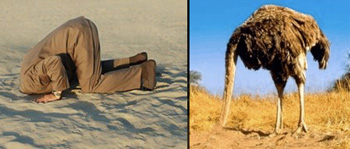“The ostrich is a noble animal … ”
By Diane Karpman
 The Internet is abuzz, while blogs and online forums are filled
with chatter about a recent decision from the 7th Circuit U.S. Court of Appeals
authored by legal giant, Judge Richard Posner. Yes, this is the same Judge
Posner who authored more than 2,500 decisions, teaches at the University of Chicago
and has written many books about the economy.
The Internet is abuzz, while blogs and online forums are filled
with chatter about a recent decision from the 7th Circuit U.S. Court of Appeals
authored by legal giant, Judge Richard Posner. Yes, this is the same Judge
Posner who authored more than 2,500 decisions, teaches at the University of Chicago
and has written many books about the economy.
Two consolidated appeals sought to overturn a trial judge's
rulings, sending one case back to Mexico and another to Israel. Both involved
product liability issues; both raised concerns on the bench regarding appellate
advocacy. Both cases involved huge corporate defendants, who argued that the
plaintiffs should have brought the claims in their own countries.
One case involved the 2004 death of a Mexican citizen in a car
accident in Mexico when a tire supposedly failed. The grieving widow sued
Ford Motor Company and Bridgestone/Firestone North American in federal court.
The corporate defendants successfully petitioned the Indiana district court
judge to throw the case out. The widow appealed.
In the other case, Israeli hemophiliacs sued the US manufactures
of blood products that were allegedly contaminated with HIV. This lawsuit ended
up with the same Indiana federal judge, who decided that the case should have
been brought in an Israeli court.
But the facts of the two cases are not generating the whirlwind
of controversy. The plaintiff's lawyer, arguing his first appeal, failed
(according to Judge Posner) to cite relevant precedent, and "such advocacy
is unacceptable."
But wait!
You may be asking yourself “did the lawyer get cited
for violating FRAP 38, or American Bar Association Rule 3.3?” Lawyers can
be subject to discipline or sanction for filing a frivolous appeal. Lawyers who
make mistakes can be subject to sanctions, discipline or legal malpractice
actions. As lawyers, we know if we make mistakes, certain known consequences
can result.
That's not what happened in this case.
 |
| These photos were included in Judge Richard Posner's opinion |
In a short, five‑page opinion, the
lawyer became the laughing stock of the nation. Judge Posner published two
pictures in his decision. One pictured an ostrich, and the other depicted a
suited man in an unusual awkward position which resembled an ostrich. Some have
suggested this is a prime example of judicial bullying, and that it was unduly
harsh. The "money quote" of the opinion was, "The ostrich is a
noble animal but not a proper model for an appellate advocate."
Many judges use sports analogies or Bob Dylan lyrics in
their creative decisions. Baseball is a favorite among members of the bench; humor
and sarcasm are often refreshing. Of course, judicial time is one of our most
valuable resources, and nobody should waste it. If lawyers are engaging in
abusive practices, the rules should be applied to their conduct. Some esteemed
commentators have suggested that judges abuse their position when they engage
in ridicule. Others have suggested that the pictures demonstrate conduct
unbecoming a judge.
The plaintiff's lawyer, David "Mac" McKeand, said,
"I think it takes some dignity away from the court."
Is it acceptable conduct or unacceptable conduct to make a
public spectacle of the lawyer? McKeand is now (and forever will be) known as
the "Ostrich Lawyer." As lawyers, we all make silent promises to
members of the bench to protect them from ridicule and scorn, because they
cannot protect themselves. Isn't there a reciprocal promise made that everyone
will behave in a civil, respectful and professional manner?
Now we have Newt Gingrich, who in the final Iowa debate
described the courts as "grotesquely dictatorial," and who wants to
subpoena justices before Congress to explain decisions he rejects.
Of course, all the lawyers and various bars – large
and small – will mount entrenched opposition to any attempt to
intimidate, coerce or manipulate the judiciary.
So … how about some reciprocity in kindness and
respect?
I am certain there are going to be some really great cases in
2012 and I look forward to discussing them with all of you.
Happy New Year!
Legal ethics expert Diane Karpman can be reached at 310-887-3900 or at karpethics@aol.com